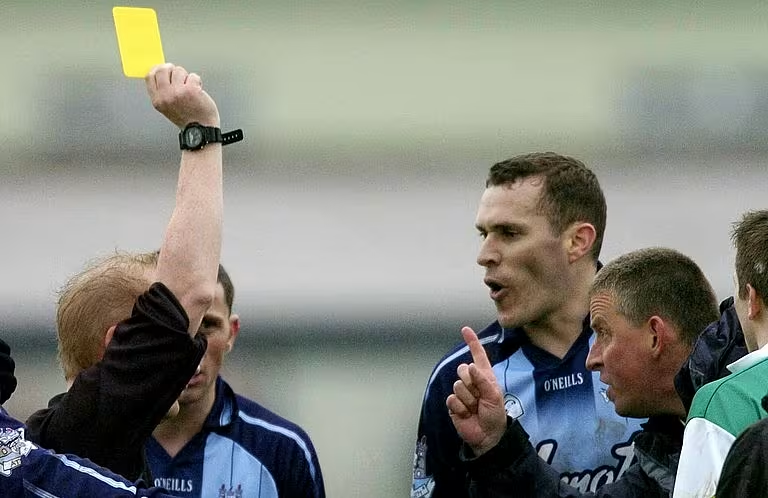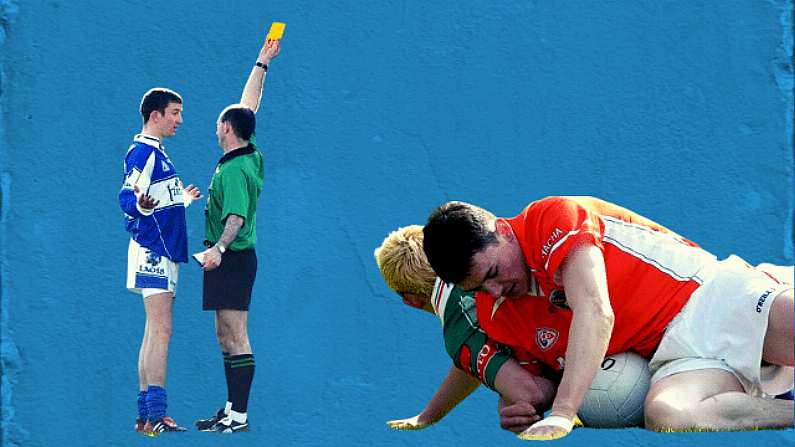Does any sport mess with their rules as much as the GAA?
It seems that every year sees the introduction of some sort of new rule, some of which have proved to be fairly disastrous.
Here are five of the worst rules that have been trialled in the GAA.
The Advantage Rule - 2021
After only one weekend of play in the National Hurling League, this one is already causing plenty of controversy.
Under the new interpretation of the rule, referees are encouraged to immediately whistle for fouls within scoring distance of the posts, as opposed to letting the play develop further.
It resulted in some very stop-start play over the weekend, often stopping players from carrying the ball up the pitch in favour of awarding a foul.
Dónal Óg Cusack and Shane Dowling both slammed the introduction of the rule on RTÉ last night, with the Cork man saying:
"That advantage rule is the worst thing I've seen brought into the game since the rubber sliotar was introduced in 2003"
Dónal Óg Cusack and Shane Dowling share their reactions to the impact the new rules made on the opening weekend of the Allianz Hurling League #RTEGAA pic.twitter.com/h2hiLuehbd— RTÉ GAA (@RTEgaa) May 9, 2021
The beauty of hurling is that energy, that momentum. This rule is actually going to take all those things out of the game, the very things that you're trying to put into it.
It's just one of those things that the GAA has to change ASAP, put it down to a mistake during the pandemic, but it just has to change.
We can't imagine this one will stick around for the long haul.
The Sin-Bin (take one) - 2005
While we will see a sin-bin in hurling and football this year to punish cynical play, it is not the first time it has been trialled in the GAA.
Back in 2005, it was suggested that any player who receives a yellow card would be sent to the sin-bin for ten minutes. It was originally meant to be trialled for the pre-season and league campaigns, although it was so unpopular in the likes of the O'Byrne Cup and McKenna Cup that it wouldn't even make it that far.
One example of the farce of the rule came during an O'Byrne Cup semi-final between Laois and Kildare, with only 26 players on the pitch at one stage thanks to four yellow cards in quick succession.
Ultimately, the bin was binned before we even got to the league.
Yellow Card Replacement Rule - 2005

However, the rule didn't completely disappear. Instead of a yellow carded player being sin-binned, they would now be replaced by another player for the rest of the game.
While this one did not cause quite as much controversy, it was another rule wherein the punishment did not really fit the crime. A player being forced off the pitch for the full game after a fairly innocuous challenge was never going to last.
The rule was not implemented for that summer's championship.
Getting Rid Of The Pick-Up - 2005
Another effort from that ill-fated 2005 league campaign, a rule was trialled that would only players in Gaelic football to pick the ball up straight off the ground from a running or standing position. Not only that, but they could punch the ball away when lying or sitting on the ground.
The intention of the rule was to speed up the game, but it didn't really work out like that. Not only did it get rid of one of the fundamental skills in the sport, it also made the general play a bit more scrappy by allowing player lying on the ground to play the ball.
Like the yellow card substitution rule, it was gotten rid of before championship.
Other rules brought in during the 2005 league campaign included the introduction of a kicking tee in Gaelic football and the scoring of a sideline cut being worth two points in hurling.
Rubber Sliotar Experiment - 2003

In the early oos, moves were made to replace the traditional cork based sliotars with a new rubber variety. However, it was a hugely unpopular move amongst players.
The ball was introduced after some felt the new playing surface the recently refurbished Croke Park resulted in a 'dead bounce' on sliotars, but the news ones went too far in the other direction.
It bounced far higher that the balls with a cork core, while they also had a very unpredictable bounce. The problem became even worse in wet weather, while players also believed they could hit the new ball much further.
Kilkenny legend DJ Carey believed the new ball would turn people away from hurling, saying:
Former players and current players should have been used to judge what the ball is like. I'm hitting the new ball 40 yards longer than the old one.
Unsurprisingly, the new ball was soon scrapped.











